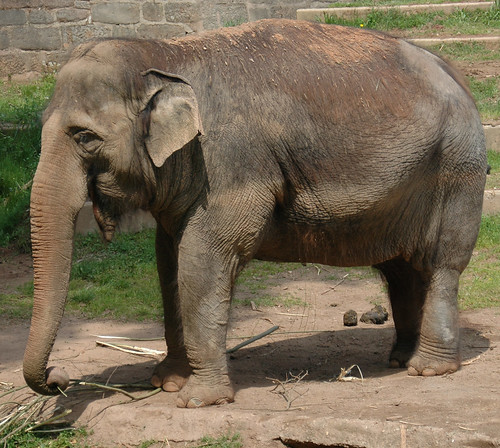
A park warden was watching a herd of elephants walk by when he noticed something. One of the adult females was very gently carrying a baby elephant who had clearly been dead for several days. When the herd stopped to eat or drink, the female placed the body on the ground next to her while she dined. After finishing her meal, she would pick up the calf and proceed to carry it to the herd's next destination. As one would imagine, the female's pace was slowed by the extra weight of the calf. Did the herd ever leave her behind? No. Instead, they walked slower, to accommodate the pace she was capable of maintaining. (When Elephants Weep, Masson and McCarthy, 1995).
Was the elephants' behavior in this situation a product of genetic survival, of some instinctive social urge? Or did the female adult feel sorrow and love for the deceased calf, causing her attachment to it? And did the rest of the herd respond with compassion by slowing their pace to accommodate the grieving female?
I'm not an evolutionary psychologist. I don't propose to be able to analyze and determine the survival value of the herd's behavior in terms of gene- or species-centered evolution. What I do know is that the behavior seen in the elephants is the same as we might see from a grieving human parent and her support network. Do we ever assume that the human parent acting in such a manner actually does NOT feel sorrow, but rather is just responding in an instinctual mode of survival?
The real question is, how much evidence do we need to accumulate to determine if a non-human animal experiences emotion vs. instinct? And, just as importantly, can we ever structure an experiment such that the results are definitive? And how do we know that, if non-humans feel emotions, that they are exact duplicates of our emotions—maybe they feel love, but it's different than our love. How can we even know that the romantic love I feel for my significant other is the same as the romantic love you feel for your significant other? If we can't really define the emotions we, as a species feel, how can we define the emotions potentially felt by different species?




9 comments:
I think it is important to stress that lack of reverence for animals is much more predominant in first world western cultures. I think the issue is a symptom of a bigger issue of the lack of respect of life -- be it human, animal, the planet, etc. -- and what we deem important and sacred as a culture. Therefore, I think it is important to reflect on the impetuts of why our culture often perpetuates such destructive behaviors and attitudes, and what we can do to begin to change this consciousness.
Intriguing post. ALhtough I'm practicing as an artist and writer for my careers, I used to hold jobs in the science fields.
Emotions vs. instinct: Yes, there's much food for thought here. I bookmarked you. LIke the variety in your site. (I commented on an older poem and would read more, but even this nightowl needs sleep. )
Touching story and thought-provoking questions you raise. Love is our essence and it goes all the way down. This same behavior is exhibited by a variety of primates. It's powerful to see.
In all reality, the elephants were probably on their way to the "burial ground." Elephants have the equivalent of cemetaries, which they visit annually. Now what does "honoring the dead" say about these sentient beings? This is usually one of the criteria anthropologists give for the switch from primate to human in our history.
Peace,
Bill
How does meditation affect the mind states? Is meditation alway good and is it simply sitting, thinking and breathing?
Thanks for the comments everyone!
Ang: Yep, you raise some very good points. Any answers? :)
Silvermoon: Thanks so much for visiting! I appreciate the comment on my poem too. I look forward to your stopping back at your leisure.
Don: Very true.
Bill: I think you're probably right. I've heard of elephant behavior as such, but have not reached the grief section of the book yet (I expect they will discuss it there). Very touching behavior on the part of the elephants.
Raj: Thanks for stopping by! There are many different kinds of meditation. Buddhism incorporates many different styles for different purposes, and there are a number of methods outside the Buddhist system. As a general answer to your question, you can check out this post where I discuss a bit, and provide a link to, mindfulness meditation. Again, this is only one type, but it's a start.
Your specific questions: 1. How does med. affect the mind states? ANS: You have to do it to find out. Me telling you isn't going to help you at all.
2. Is med always good? ANS: What does "good" mean? Meditation is, and it has effects. There's really no good or bad about it.
3. Is it simply sitting, thinking, and breathing? ANS: Some Soto zen techniques are simply sitting. Almost no meditation methods are simply thinking. And breathing...good luck trying to meditate without breathing. :)
I simply meant that it would be like drinking 50 glasses of water in just one day. Obviously, drinking water is good but maybe not that much.
It has been my experience that the level of balance that a person feels can be sorted in the following manner:
Buddha state
Centered
Normal
Average
Distracted
Nervous
Anxious
Nice blog, thanks for posting
Post a Comment